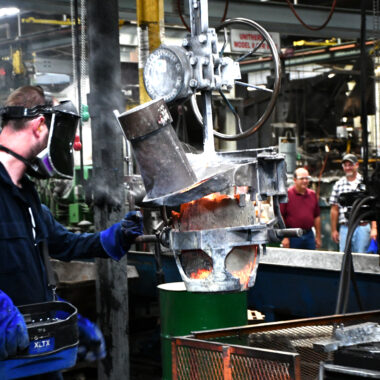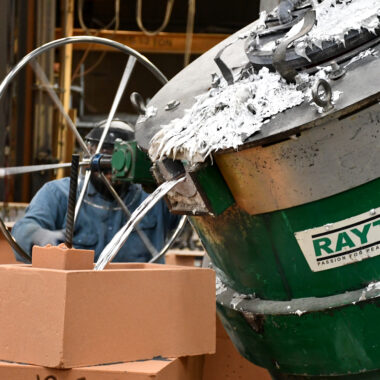The Ultimate Resource for Casting Aluminum Illinois
The Ultimate Resource for Casting Aluminum Illinois
Blog Article
Achieving Quality in Aluminum Spreading: Important Tips and Techniques
In the realm of aluminum casting, high quality and accuracy are extremely important (casting aluminum illinois). The procedure of changing molten aluminum right into durable and intricate parts needs a thorough approach at every stage. From meticulously selecting the appropriate materials to refining putting methods and making certain meticulous completing touches, accomplishing excellence in aluminum casting requires a mix of know-how and focus to information. As experts in the area strive to perfect their craft, mastering a set of important pointers and techniques comes to be important. Let's check out the crucial elements that can raise light weight aluminum spreading from excellent to phenomenal, setting the phase for unmatched results and unequaled craftsmanship.

Products Choice
Selecting the proper materials is vital in making certain the success and high quality of your light weight aluminum casting jobs. The choice of products considerably affects the last homes of the casted products, including strength, toughness, and overall high quality. When selecting materials for aluminum spreading, it is crucial to consider aspects such as the sort of light weight aluminum alloy, the wanted mechanical residential or commercial properties, and the casting method being utilized.
Light weight aluminum alloys are generally made use of in casting due to their light-weight nature and excellent mechanical properties. The selection of the certain alloy relies on the application needs, with alternatives varying from high-strength alloys appropriate for architectural components to corrosion-resistant alloys for aquatic settings. Recognizing the characteristics of different aluminum alloys is vital for choosing the most ideal one for your job.
Moreover, the spreading method utilized, whether it be sand spreading, pass away casting, or investment casting, likewise affects material option. Each spreading method has its own needs in regards to material fluidity, thermal conductivity, and mold compatibility. By thoroughly thinking about these factors, you can make certain that the materials chosen are tailored to fulfill the particular requirements of your light weight aluminum casting project.
Mold And Mildew Preparation
In the world of aluminum spreading, the thorough prep work of mold and mildews stands as an essential precursor to the actual casting process. Mold preparation includes several necessary steps to make sure the high quality and accuracy of the final cast item. It is vital to cleanse the mold completely to eliminate any dust, deposit, or previous casting remnants that might compromise the brand-new actors. This cleansing procedure aids preserve the honesty of the mold and protects against issues in the end product.
Following, using an ideal mold and mildew covering is crucial to facilitate the launch of the actors aluminum and improve the surface area coating of the component. The type of finish used will certainly rely on elements such as the complexity of the mold, the preferred surface finish, and the spreading material. Furthermore, proper airing vent and gating systems have to be included right into the mold and mildew layout to enable the smooth flow of liquified aluminum and protect against the formation of air pockets or defects in the actors component.
Melting and Pouring Techniques
To achieve effective aluminum casting, grasping efficient melting and putting methods is extremely important for making certain accurate and high-quality outcomes. The melting process is a vital step in light weight aluminum casting, where the steel is warmed to its liquid state. It is necessary to keep an eye on the temperature level very closely to protect against overheating, which can cause bad casting top quality. Using induction furnaces or gas-fired crucible heating systems can supply specific temperature control and reliable melting.
Once the light weight aluminum reaches the preferred molten state, appropriate pouring strategies must be used to move the steel into the molds. The speed and uniformity of the put are critical aspects in achieving uniform filling of the mold and mildew tooth cavity and reducing the risk of issues like air entrapment go to my site or insufficient casting. Gravity pouring, low-pressure casting, or centrifugal casting approaches can be utilized based upon the specific needs of the job.
Cooling and Solidification Control
Attaining precise control over the air conditioning and solidification procedure is essential in aluminum spreading to keep the stability and high quality of the final casted items. Appropriate cooling and solidification control assistance prevent flaws such as porosity, warm tears, and shrinking that can jeopardize the mechanical properties of the casted aluminum components.
One necessary aspect of cooling and solidification control is the design and placement of cools. Cools are metallic things strategically positioned in the mold to absorb heat rapidly from specific locations of the spreading, advertising uniform solidification go and reducing the possibility of problems. Furthermore, controlling the air conditioning rate by adjusting the mold's material, layout, and the application of insulating finishes can affect the microstructure and mechanical homes of the final casting.
Additionally, surveillance and managing the cooling procedure via the usage of thermocouples and computer simulations enable real-time adjustments to enhance cooling rates and solidification patterns. By executing these techniques, factories can enhance the high quality and uniformity of their light weight aluminum castings, fulfilling the stringent requirements of different sectors.
Finishing and High Quality Examination
Correctly implemented finishing and quality examination procedures are important in ensuring the overall stability and reliability of light weight aluminum spreadings, building on the careful cooling and solidification control strategies utilized throughout the spreading process. Ending up strategies such as grinding, sanding, and polishing aid get rid of excess product, smooth harsh surface areas, and improve the castings' final appearance. These processes not just improve the aesthetic charm however additionally ensure dimensional accuracy and performance.

Verdict
Finally, attaining excellence in light weight aluminum casting requires cautious factor to consider of materials option, thorough mold preparation, exact melting and pouring strategies, effective air conditioning and solidification control, in addition to detailed completing and high quality examination processes. By complying web link with these vital suggestions and techniques, makers can guarantee the manufacturing of high-quality aluminum castings that satisfy sector standards and client expectations.
When choosing products for light weight aluminum spreading, it is essential to think about variables such as the kind of aluminum alloy, the wanted mechanical residential properties, and the spreading technique being used.
Furthermore, the spreading method utilized, whether it be sand casting, pass away spreading, or investment spreading, also influences product option.In the world of aluminum spreading, the thorough preparation of molds stands as a critical precursor to the real casting procedure. Gravity putting, low-pressure spreading, or centrifugal spreading techniques can be made use of based on the specific demands of the project.

Report this page